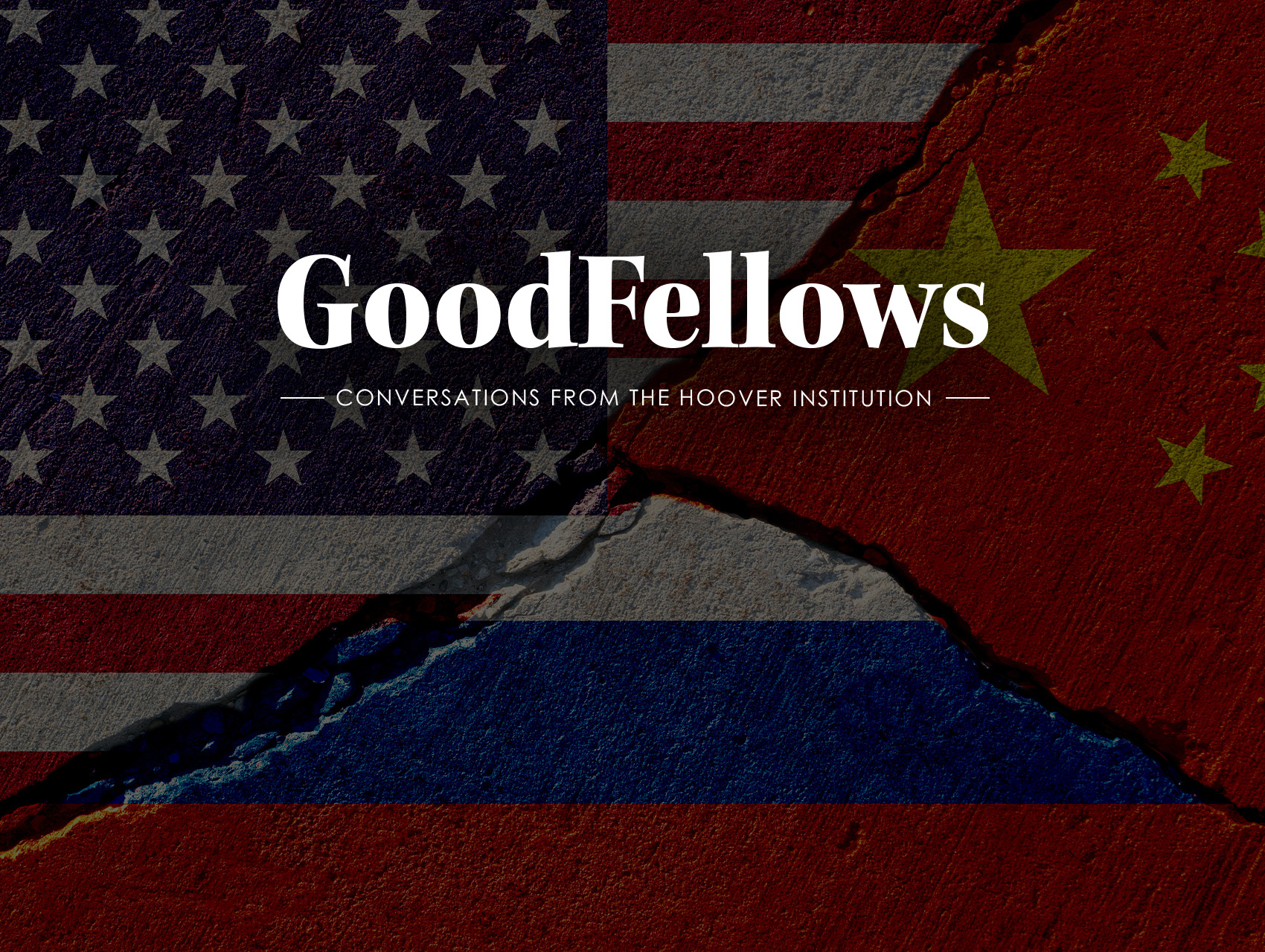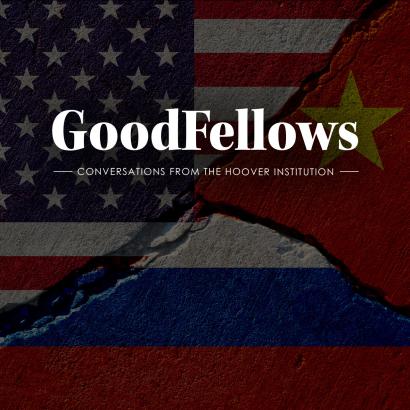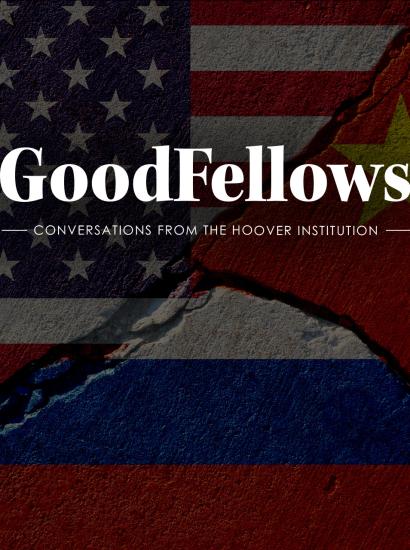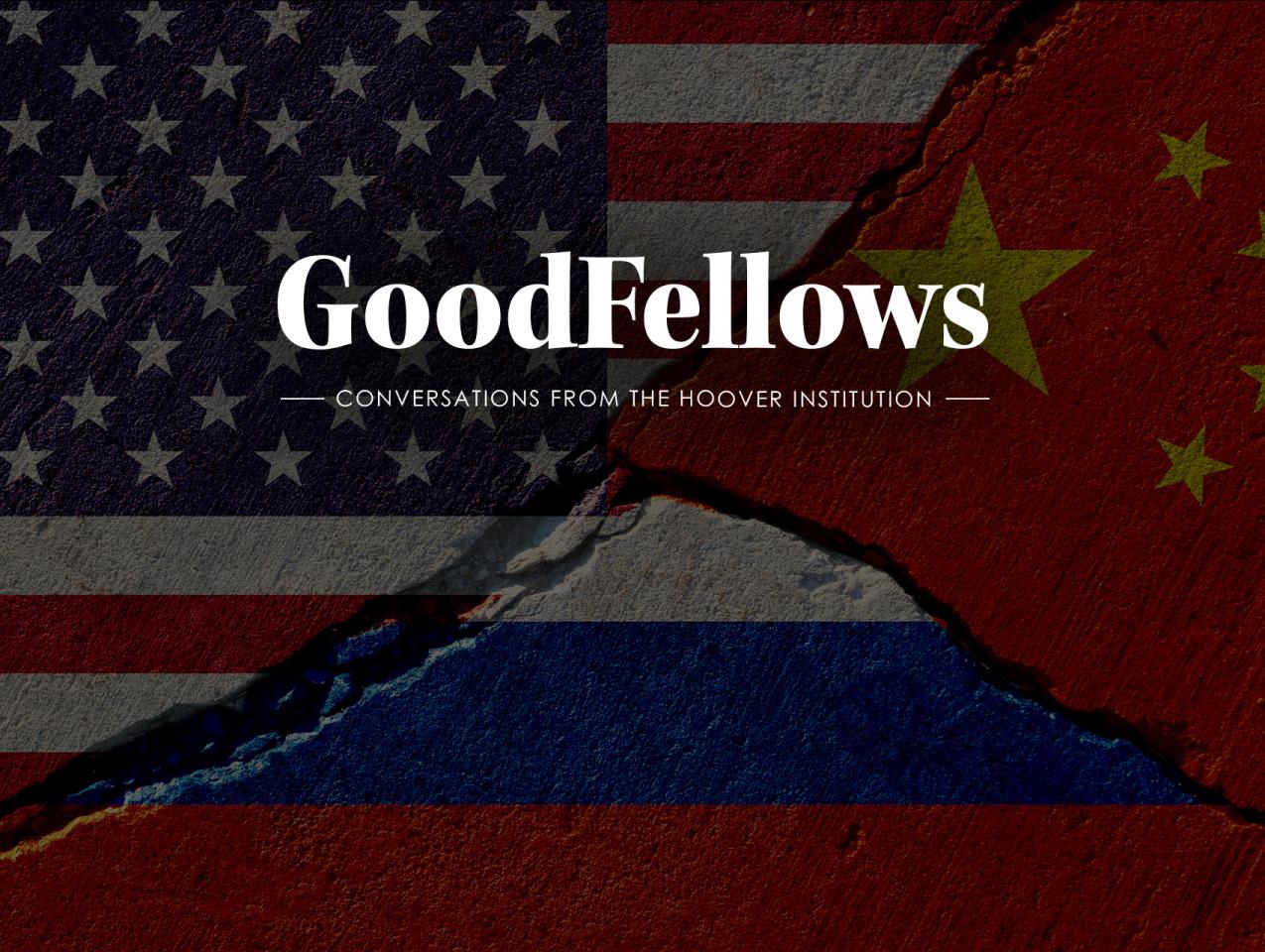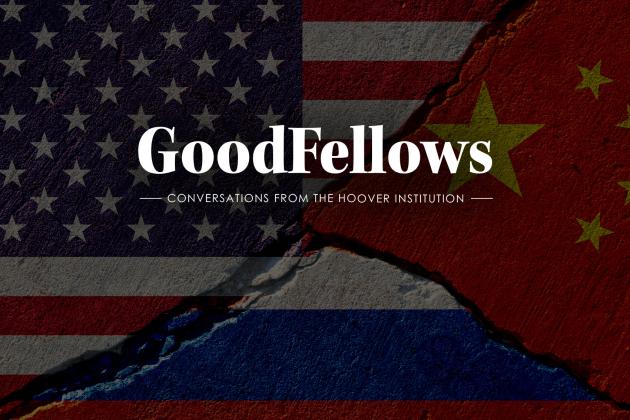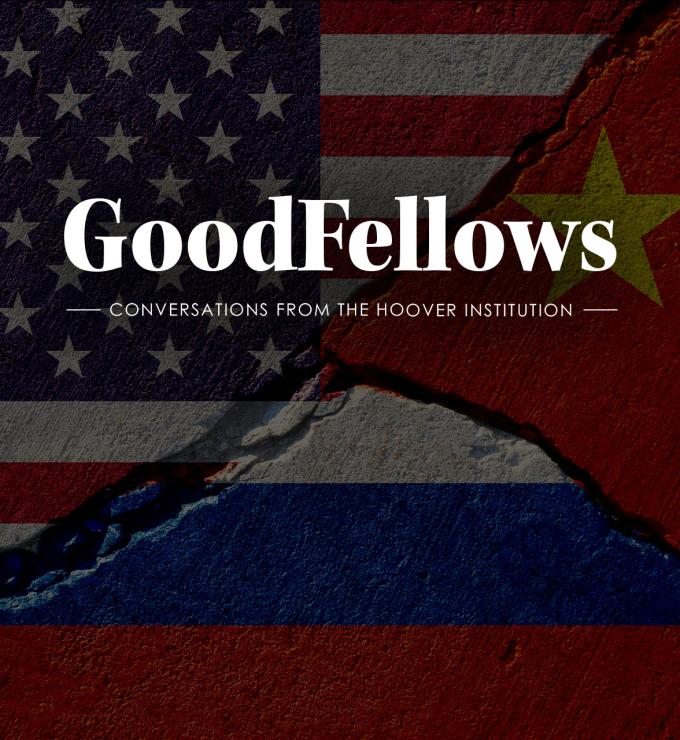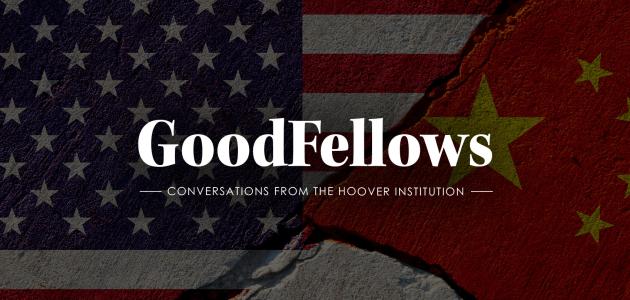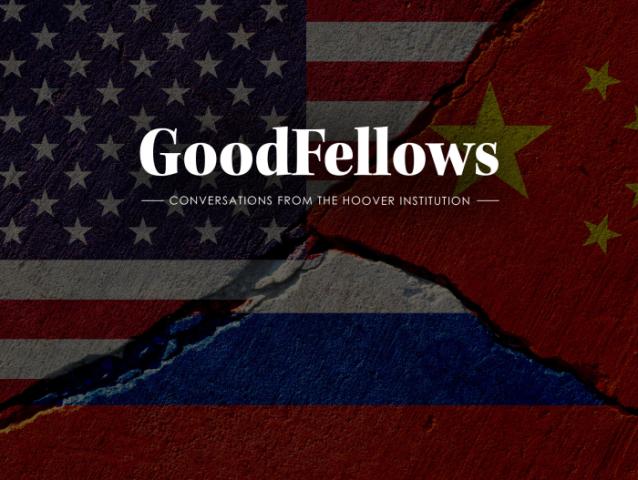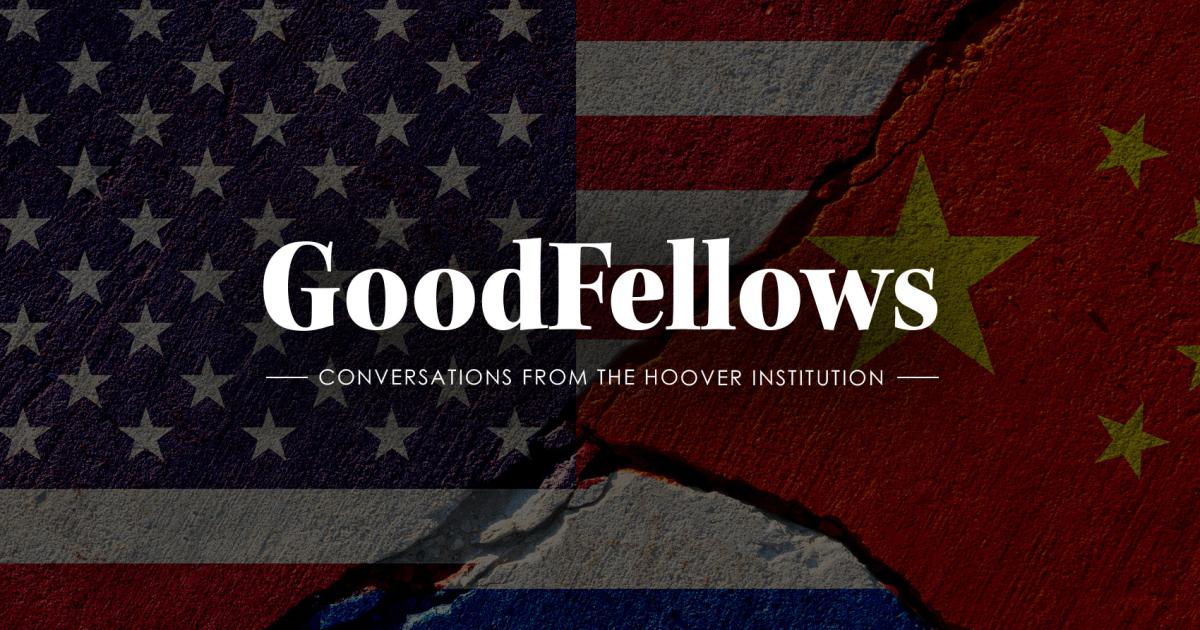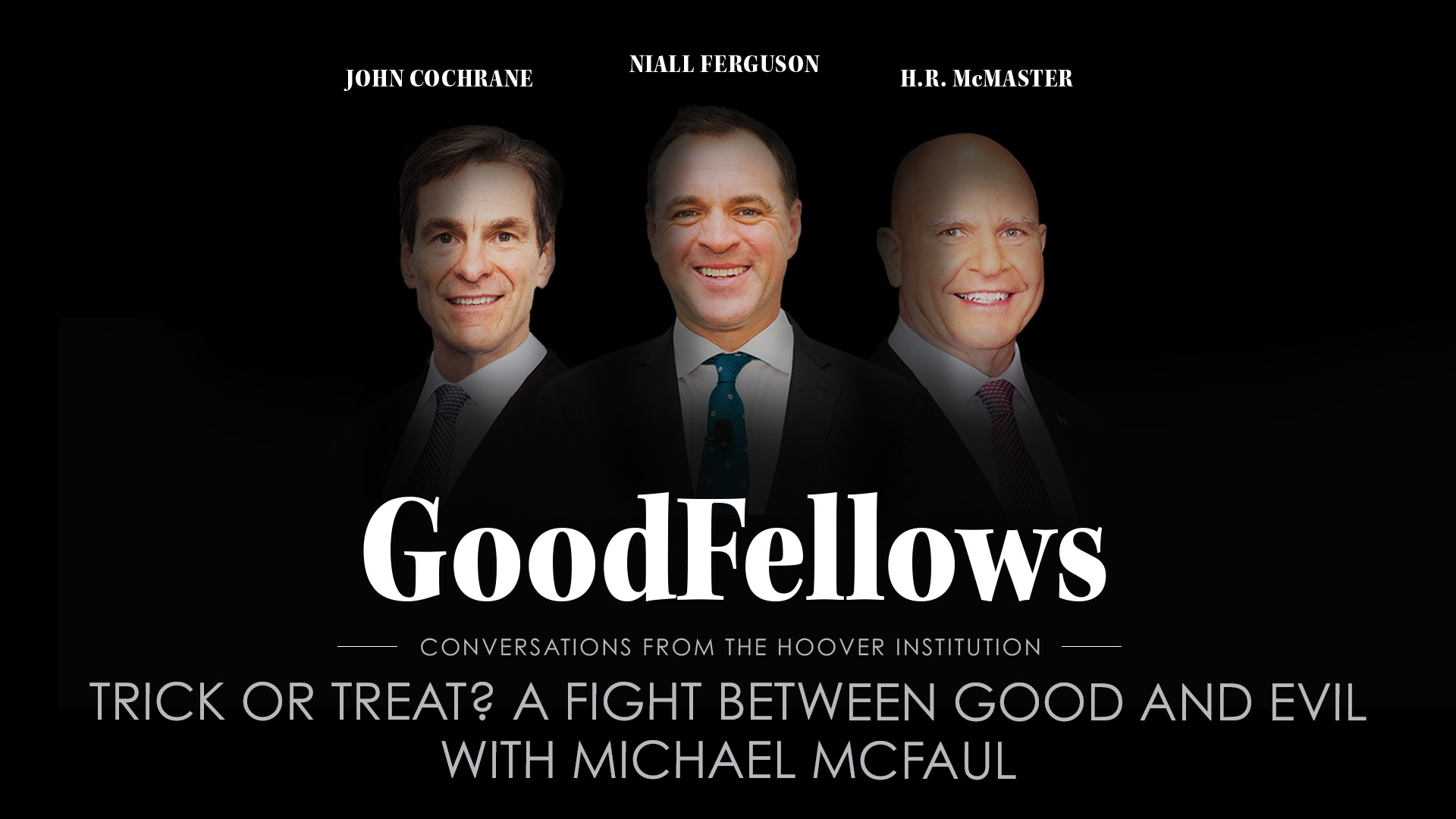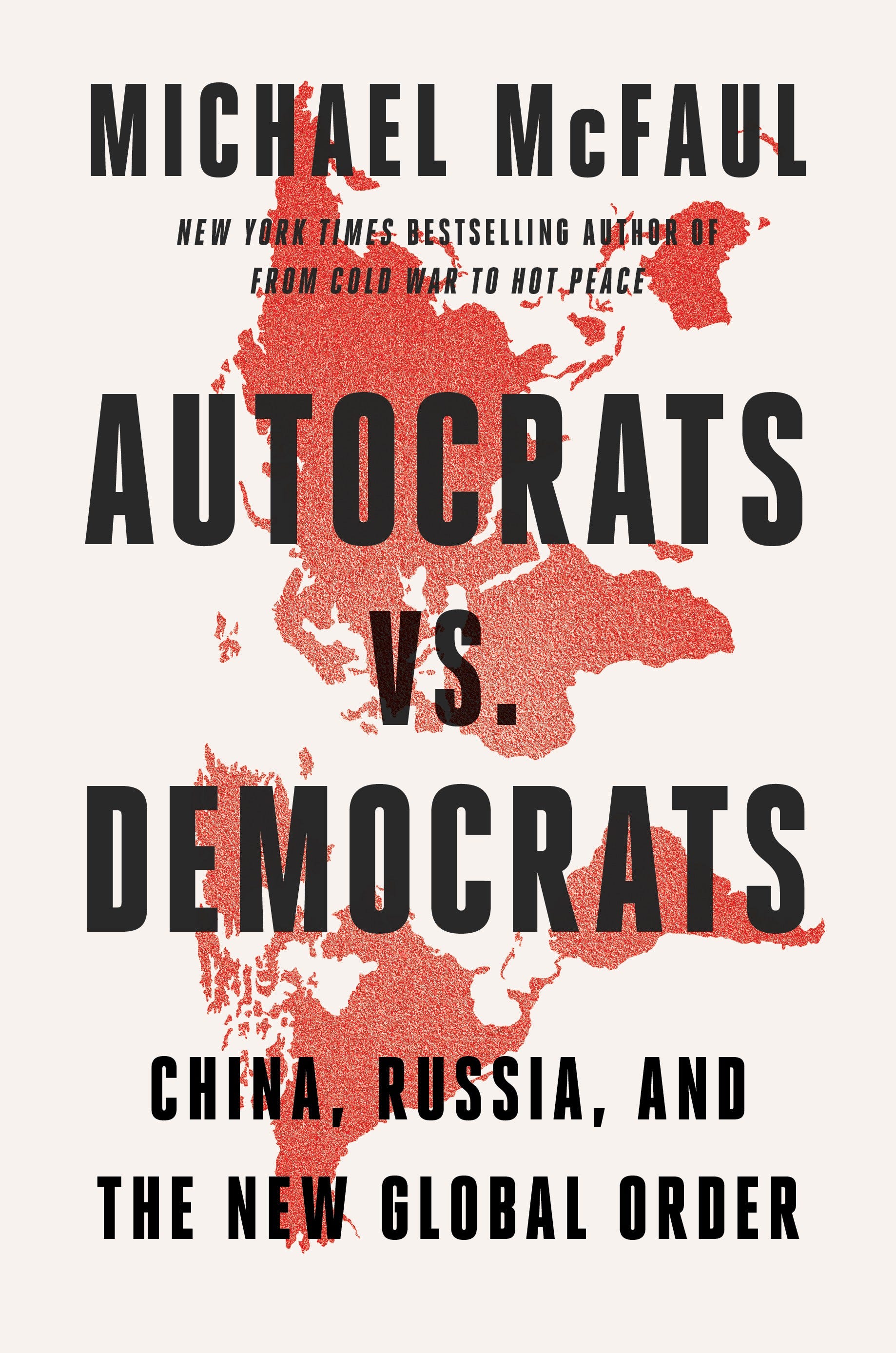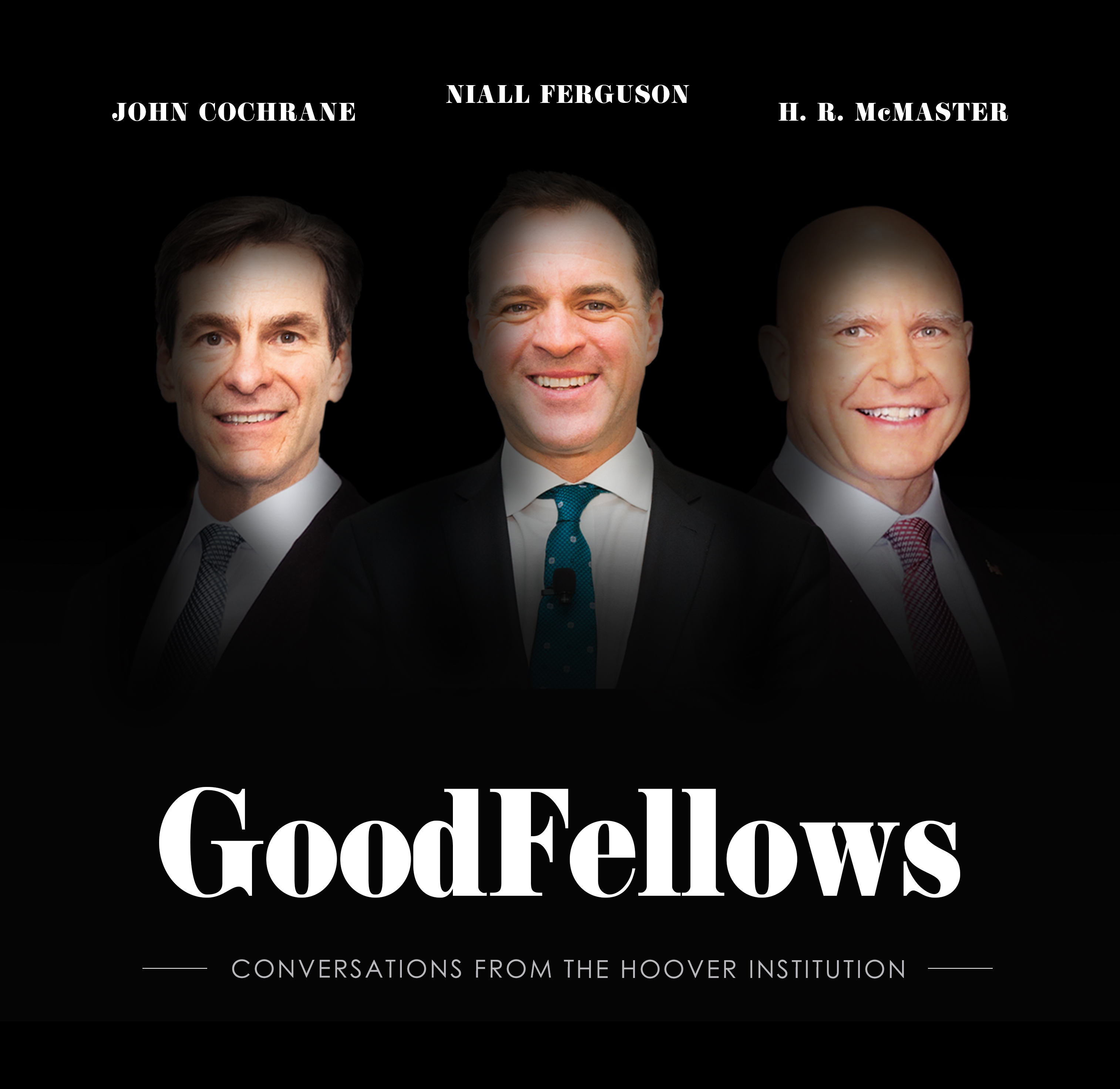- International Affairs
- Key Countries / Regions
- China
- Russia
- History
- Military
- Confronting and Competing with China
- Determining America's Role in the World
At a time of “hot wars” across the globe, there’s also an ideological “cold war” featuring two foes: those who embrace freedom and those who oppress it. Michael McFaul, the Hoover Institution’s Peter and Helen Bing Senior Fellow and author of the newly released Autocrats vs. Democrats: China, America, Russia and the New Global Disorder, joins GoodFellows regulars John Cochrane and Lt. Gen. H.R. McMaster to discuss where he departs from the Trump administration on its approach to Russia and China (one autocracy economically dwarfing the other), his suggestions for course change, and why he holds “guarded” optimism for America’s future. After that: John and H.R. go “trick-or-treating”—weighing the pros (“treats”) and cons (“tricks”) of a new White House ballroom, a Chinese military purge, the latest inflation numbers and gold prices that no longer glitter, a CEO’s tariff worries, New York City on a non-hallowed eve of “democratic socialism,” plus a new and tougher American citizenship test (could Sir Niall Ferguson pass it?). Finally, as Halloween approaches, John and H.R. give us their go-to candies.
Recorded on October 28, 2025.
- It is Tuesday, October 28th, 2025, and welcome back to GoodFellows at Hoover Institution Broadcast, examining history, economics, and geopolitics, and a few other matters in the news. I'm Bill Whalen. I'm a Hoover Distinguished Policy fellow. I'll be your moderator today, joined by two of my colleagues whom we jokingly refer to as GoodFellows. That would be the economist, John Cochrane, and former Presidential National Security Advisor, Lieutenant General H.R. McMaster. Gentlemen, it's good to see you. Hey, great to see everybody. H.R. especially good to see you. Your Philadelphia Phillies kind of unceremoniously exited from the playoffs and you disappear from the show. I hope the two were not linked throws to the plate. Oh my goodness.
- He throws it away and the Dodgers have won. How, how do you not go to first, how do you, how do you not go to first? Okay, I don't wanna talk about,
- Okay, we won't talk about that. We have a few weightier issues with baseball to get in today. A two part show for you. The second part of the show, we're gonna go trick or treating, and let me explain that. I'm gonna give you a series of issues, and you're gonna tell me whether they are tricks as in bad news or treats as in good news. But first, we're gonna go to a topic that's a little less seasonal here at the you on this show, something we talk about year round. And that is the Great Powers Competition. And joining us for this discussion is our Hoover colleague, Michael McFaul. Mike McFaul is the Peter and Helen being senior fellow here at the Hoover Institution, as well as a professor of Political science and director and senior fellow at the Freeman Spokey Institute of For International Studies at Stanford University for January, 2012 to February, 2014, Mike McFaul served as the US Ambassador to the Russian Federation before becoming Ambassador. He served for three years as a special assistant to the president and senior director for Russian and Eurasian Affairs at the National Security Council. He joins us today to talk about his latest book, literally Hot Off the Presence as today as its release date, the book's title, autocrats versus Democrats, China America, Russia, and the New Global Disorder. Mike, welcome back to GoodFellows, and thanks for joining us in your sleep deprived state. I understand you're up to all hours watching that in sipping baseball game last
- Night. Well, I couldn't make it to the end, but thanks for having me. Really appreciate
- It. My pleasure, Mike. We'll get to the book in a moment, but first, let's talk about the complicated relationship that is Donald Trump, Vladimir Putin, the United States, Russia, and Ukraine. Last week, Mike, there was supposed to be a summit and Budapest between Trump and Putin. It does not happen. The Treasury Department properly sanctions two Russian oil companies. And then there's ongoing question about whether or not Ukraine's gonna get long rage Tomahawk missiles. President Trump says no saying it's too complicated to teach 'em how to fire them, but nato Secretary General says it's still in place. So, Mike, tell us what's coming next.
- Well, first of all, I don't know, and talking about President Trump with HR McMaster on the on the line, I'm gonna defer to him. He understands the president, our president a lot better than I do. I I do know what I think is good for America's national interests and is good for small D Democrats around the world, which is that this is a fight between good and evil. That's the way I see it. Putin is evil. He is a barbaric imperialist. He's slaughtering innocent civilians every single day. He is kidnapping Ukrainian kids, and he's killed his opponents back home, including two of my personal friends, the Ukrainians, they're, they're on the side of good, they didn't do anything wrong. They didn't threaten Russia. They're a democracy. Putin's a dict, a dictator, and they're fighting for the freedom of their country. But I also think they're fighting for the freedom of all of Europe. And I actually think this is related to what's happening in Asia, too. I was recently in Taiwan, Taiwan about three months ago, and I lo saw many government officials who are following very closely in Ukraine. In fact, I saw a lot of Ukrainian flags in Taiwan because they understand how these things are intertwined, what we should have done, going all the way back to the beginning of the war. And I, I would even go back to the early 1990s in terms of mistakes, but we, we won't go through the whole history, but when this happened, we should have given Ukrainians all the weapons they needed to try to stop the Russians on the battlefield and put in comprehensive sanctions right away. I think the incrementalism, most certainly before the full scale invasion started in 2022, but even after it did, has not led to good outcomes for our, our security interests. And, and I just wish we would've done it all back then with respect to President Trump. And again, H.R. knows the president a lot better than I do, but I've witnessed his, you know, his relationship with Putin, and it's been a close relationship for many, many years. He, he doesn't divide the world in autocrats and Democrats, it seems to me. He divides the world into strong leaders and weak leaders, irrespective of whether they're autocrats or Democrats. But lately I've seen the President, in my view, becoming more sober and more realistic about how to deal with Vladimir Putin. And that has been positive in my view. He initially came in and it sounded, it just seemed like they just wanted to give Putin whatever he wanted. His special envoy, Steven Whitcoff would go to Moscow and just to kind of wr write down the laundry list and bring it back, and then putting pressure on the Ukrainians. And I, I know the Ukrainian government pretty well. I've worked with a lot of them, hosted presidents Zelensky at Stanford before the war. But that didn't work. You know, Putin just kept asking for more. I do think Putin overreached in his asks and this audacious ask he had of getting Trump to convince Zelensky to withdraw from the parts of Donbas, that's his part, a region in eastern Ukraine where Ukrainian soldiers are. And he hasn't been able to conquer Donbas since 2014. I just think he overreached on that, and I think the president has realized that. So I appreciate his rhetorical change. You know, it changes his mind from time to time. But, but he's talking different about President Putin and he's ever talked about him. I appreciate that he sanctioned these two oil companies that should have been done three and a half years ago, but better late than never. But now I think he needs to take on the challenge of providing more weapons, including these tomahawk weapons. And as I say, on, on all podcasts and, and tv. I'm not gonna pretend to be a general on tv, and especially when I'm on a podcast with an actual general. So I'll let H.R. talk about, you know, the heart limitations and har how hard it is to use tomahawks. But we need to give those Ukrainian warriors more means to stop the Russian soldiers. In fact, I just met with one of 'em just a few days ago. A woman who signed up to join the, the army became a sharp shooter in 2022, is now working on counterintelligence and her plea to me. And so my plea to our administration and the entire free world is give us the means to stop these invaders and we'll take care of it ourselves. They're not asking for our soldiers. And I think that's the prudent strategy moving forward.
- Hey Michael, you know, one of the things that I, I think that, that several administrations have had in common to address kind of president Trump's, you know, vacillation here on Putin and just continued desire to want a good relationship, is that every American president has kind of fallen for that. Based in, in my assessment, I'd love to hear what you think about this, that really what the motivates Putin is his security concerns. And if we just allay his security concerns, things will get better. And he will realize that his future lives with Europe and the West and, you know, not, not with China and, and his, his own kind of revist agenda, but you know, what really drives him and makes him more aggressive, I think is the perception of weakness. And what he's driven by is this kind of obsession with restoring Russia to national greatness based on the sense of honor lost at the end of the Cold War. And, and now you were a student of Russia. You went to Russia right after the Right, right at the end of the Cold War. Yeah. You, you, you've tracked Putin his whole career. You know, what, what do we get wrong? What do we, including president, what are many presidents, you know, from President Bush who looked into his soul, right? Yeah. You had the, the effort for a reset with Russia under the Obama administration. You had, of course, president Trump's desire, Hey, wouldn't it be great if we have a good relationship with Russia? Yeah. And then, you know, president Biden went to Geneva, right? Yeah. You had to lay out his deadlines and thought he could maybe. So what do we get wrong about Putin in Russia?
- Well, that's a big great question, and that's takes me a long time to answer it in the book. In fact, all of these are big questions. That's why the book's 500 pages long
- Page Turner though, Michael. It's a
- Page. Yeah, yeah, yeah. Page turner. Well, just so you know, it used, it used to be 1200 pages long 'cause I override everything. So I've, I've done some editing, but, but I'd say a couple of things. 'cause I think it's a fundamental question about the nature of great power competition. Yes. Power is a driver of it, right? You're, we're not interested in a, a, a podcast about us kgi competition because, and I don't mean any disrespect for the country of Kirstan, but they don't have enough power to threaten us. So we don't, we don't have to care. We don't need to know what their intentions are. 'cause it doesn't matter. Russia has power to change the borders tragically. And Russia has power to threaten our national interests as Xi Jinping does. So capabilities, everything starts with capabilities. But my book is titled Autocrats versus Democrats on Purpose. Because I don't think capabilities is the whole story. I do think regime type and leaders matter as well. And so when I trace the history, H.R. of US China relations and US Russian relations starting in the 18th century, I start in 1776. It's the, the combination of those three variables, right? Power regimes and individuals. And I know that's not very, you know, the, the, it's academia, political science, and I don't know the discipline of history as well as I should, but political science, we don't do a good job of writing about
- It. Sounds like we're converting you, Michael, you're talking about history
- Man's awesome. Well, just so you guys know, in the Department of Political Science from time to time at Stanford, I am sometimes referred to as a historian, and it is not a compliment, just so you know,
- But hey, Michael, you know the old joke, right? That the, you know, the, the political scientist says the historian, okay, okay, that works in practice, but doesn't work in theory.
- You know, John, John Cochrane likes to be called a historian. John, why don't you jump in here
- That we, that was, I thought that was the University of Chicago economist, but I guess we retell good jokes in, in many different ways. I'm, I would love to hear out, out front Ukraine, hawkishness, 'cause I've been on that end since this show started, and it, but let, let's try to understand what Trump is doing here. The, the Biden administration. Why did they not do stuff? They thought, well, we don't want to escalate not thinking about, well, maybe he should be worried about us escalating, not the other way around,
- Right?
- And, and so it was the, the appease and escalation strategy. I don't think that's what's going on with Trump. Trump's negotiation style seems to be cycle between flattery and threats. And some of this feels like the, the flattery end of it. Oh, we, you know, we, we'll, we'll be nice to you. We won't send you cruise missiles along with the, he's a great guy and so forth, which then goes to threat. Now, I would've thought the lessons of Iran and Hamas recently was that the threat end is much more successful if you wanna bring people to the, at least the negotiating table,
- Right?
- If not to actual defeat, I mean, wars end with defeat. Let's be clear, you know, even negotiations, which are saying was let's freeze this for a while. North South Korea, east West Germany, and continue to fight by other means as opposed to no, you're, you're really gonna give in. And, and that's the end of that, which is, you mentioned capabilities. The striking thing here, of course, is that the diff the capabilities of NATO and the US versus Russia is just overwhelming, right? We've never seen anything like this. If we wanted to do something about it. Now, sitting in the, sitting in the wings is China and it's not so clear, you know, the will may be lacking in both cases, but the capabilities is, is not so clear in the China thing. So I just think that even adds to the case. Give them the tomahawks, give them what it takes, you know, this is over pull back to pull back to the pre 2014 borders or else.
- Well, I, I agree and, and I wanna build on what, talk about Putin a little bit and then capabilities and intentions. So, H.R. actually met Putin in 1991. So I met him when he's the deputy mayor of St. Petersburg. I wouldn't say we're Facebook friends these days 'cause he's not only banned me from Russia, he wants to arrest me. But, but I think there's been an evolution, John, in his thinking, and I wanna be clear about this, and I know this is controversial. You know, he, initially he was an accidental president that, you know, the circumstances, the 1998 financial crash, they needed to find somebody to run against the communist. And they picked this guy, and then I think they may have started a war to, to, to promote him. That's controversial statement. But our former colleague, John Dunlop, wrote a, a great book about that. But back then, you know, he talked about cooperating with the west and on economic policy, he introduced a flat tax and a Hoover idea, by the way, of 13% individual tax. He cut corporate taxes. He was surrounded by, you know what I would consider smart people, the people I knew well, and, but over time what happened and what really frightens him is not NATO expansion. That's a complete myth. It's democratic expansion. Yeah. And, and when, you know, first in Georgia 2003, then the Orange Revolution in 2004, those are the events that really rocked his world, was not actually the war in Iraq. I, I sat and listened to him, talked to Obama about it in 2009. And then the de revolution of, of de democratic, you know, of dignity, that's what they call it, revolution of dignity in 2014, the Ukrainians, he says that, that it was a CIA conspiracy that we did that, right? And so that's what he's most obsess about. And as a result of that, because it's so ideological, he's not transactional. And I heard so many times, you know, he's transactional guy. We just gotta do a deal with him. And I, I don't think he's motivated by these bigger ideas, and therefore you have to stop him on the battlefield. It's not about convincing him, you know, we're gonna convince him through a good argument to stop his war. No, you need to stop his soldiers on the battlefield. That's when he'll negotiate. And that's why tragically but necessarily they need more weapons.
- And so what you're saying is that the deal that our side wants, which is, you know, you even get to keep the donbas, we sort of stop. There's a DMZ and so forth, that's not happening because that deal includes, and Ukraine is on our side and, you know, they, they become the tech hub for defense in Europe and they sort of start joining the European Union and they, you know, they, they'll maybe they'll be the next Argentina Europe that is just not happening in Putin's mind, is what you're telling me.
- Well, I wanna be wrong because I want this word to end. And I, you know, I hope that through a stalemate on the battlefield, he might see the wisdom to, to stop fighting. But I fear that if, if there is a democracy in Ukraine, that's a threat to Putin. If there's a thriving capitalist economy in Ukraine, that's a threat to Putin. Because to go back to the Cold War one, you know, as I do in the book, one of the great things we did is our economy outperformed the communist economy economies. West Germany, outperformed East Germany, we outperformed the Soviets, South Korea outperformed the North Koreans, et cetera. And that's one of the reasons we won the Cold War. And Putin gets that. He understands that, and that's why I think he's gonna be obsessed with weakening Ukraine for a long time to come.
- Michael, could I ask you just a broader question then too, because, you know, I think his goals go beyond, obviously beyond Ukraine, right? It is part of this grand design to reestablish the Russian empire. And he really, really, what he wants to do is break apart Europe and run the transatlantic relationship.
- Yes.
- Kill nato. So when I've looked at like, what, what Putin's been trying to maneuver into, what he wants is he wants President Trump to, to agree to terms for a ceasefire that are unacceptable to the Ukrainians. And to use that as a wedge to drive the United States away from Ukraine, but also across Europe. And can you may maybe just talk a little bit about what Putin's grander designs are, because when Americans say like, oh, why do I care about Ukraine? You already mentioned the connection to security in Indo-Pacific, but could you also talk about what's going on more broadly in terms of Yeah, Russia's designs on Europe?
- It's a great question, and I spent a lot of time in the book talking about it with respect to the revisionist powers, China and Russia and hr. That was your national security strategy where you use that F framework. And, and I use that in the book. And by the way, your national security strategy, it's a slide in my book talk, just so you know. I give you a shout out for that. And then I show that I quote Secretary elect Blinken saying the Trump administration was right about China. So that's all on the slide deck. I'll send it to you guys. So, so you see, that's the way I talk about,
- That's the affirmation I was seeking right there.
- I wanted to make sure I said that before I move on to other things. But, but what I also talk about, I have three chapters on ideological competition and putinism, which I think is an ideology, and we can argue about it or not. But if liberalism is an ideology, then Illiberalism is also an ideology. He is an illiberal nationalist. And what he sees is he wants to break down the liberal international order or, or just the west. He wants to break apart nato. Let's make it more simple than that. He absolutely does. He wants to go back to a world of spheres of influence where Russia is a respected power with other ones. And he is invested a lot in that. I think people underestimate that. You know, Russia today is pr propagating these ideas. He's got his own set of NGOs, they're meeting with NGOs in Europe and America. I remember when I was the ambassador, I got this memo, you know, a cable to go out where a group of evangelical leaders from a southern church, I think in Mississippi, were in Russia, this is 2012, to meet with a Russian Orthodox church to talk about their common values. And you know, the Cold War to Oversimplify was mostly a fight between, you know, communist states and free states and red team and blue team, right? And, you know, we had, we had some communists around, you know, they're up in Berkeley. That's a Stanford joke, but they were there, I remember I met, you know, I would see these guys, they're kind of kooky, but they were not mainstream. There's millions of Europeans who like Putin and you know, in Hungary, Italy, France, the UK and the United States. And he is playing this game to divide us within, to weaken our resolve as a, as a unified nato and as a unified free world. And I think we've just gotta realize this is a fight not just between states, but within them. And then get smarter about how to fight back.
- Mike, let's, let's drill into the book a little bit. The title again, autocrats versus Democrats, China America, Russia, and The New Global Order. Very disturbed that you say this is your last book. You are a young man. And look at John Cochrane. He's just, John Cocus still cranking up books and we're just hitting Pete Cochrane right now, so don't stop writing. Okay,
- Well, I don't know, this book took me years and years to write.
- Well, after a couple months, Michael, you think, oh, that was easy. And then you'll try, you'll talk yourself into start. Okay? You'll talk yourself into start in another one, in a couple.
- We'll see, we'll see. But this, this was a hard book and a long book because I wanted to wrestle, first of all, I wanted to know why there's, there's conflict and, and I wanted to look at eras of cooperation. So that's why I had to go back to the 18th century. And I wanted to wrestle with these variables of power regime type and individuals. So to get variation on that, you need 250 years of history. But that almost killed me to learn that. And then the, but but then in towards the end, I, I do wanna make, I, I have three prescriptive trap chapters. And, and that's the piece that, that to me matters most because I, I've, there, I I talk about similarities and differences in the Cold War. We can go through them if you're interested. But one of the big differences here within the United States is these isolationist tendencies that we have in both parties. The Republican Party and Democratic Party. And that scares me and polarization that we have in our society. And there was polarization in the late sixties and early seventies. I get it, I know I go through that history, but it worries me that we're pulling back and it, I just don't think that serves our long-term national security interests. So the animating argument was why, why it serves our interests to be engaged versus to pull back why it serves our interests to have allies as opposed to going alone. And why it serves our interests to promote ideas of freedom and liberty and democracy. I think those are good things to promote ideologically, but I also think they serve America's national interests. And what I think, you know, elites, and I'm not going to generalize for others, I'll just say about myself. I spent a lot of time talking about these kinds of ideas and Washington and Palo Alto and Cambridge on occasion, and Brussels, this book. I want to be in other places. And I already have been, I was in South Carolina last week. I was at UT University of Texas, Arlington, the week before. I'm heading to Pennsylvania next. I'm going Erie, Pennsylvania, Akron, Ohio. 'cause I think we have to have these debates with all Americans, not just elites. 'cause if we don't, if we don't convince America that this is in our long-term interests, we're gonna pull back. And I think we're gonna make a lot of mistakes.
- Can can I ask, I wanna ask the economist question about the Cold War analogy. I I don't think Putin in Russia is the issue. You mentioned Europe, the people who are saying nice things about Putin in Europe, they're sort of right wingers who say, look, the left wing's been wrong about everything else. They're probably wrong about this too, but it's not a deep affection for let's do things in Russia. They're kind of playing around.
- Yeah,
- Russia is the Cuba of the Cold War. It's not the Soviet Union.
- Yeah, I like that. That's a great analogy. Good.
- I like that. And now China is, is the issue.
- Yes, of
- Course. And here as an economist, I, I worry a lot because the central difference between this and the last Cold War is Soviet Union was an economic basket case.
- Yes.
- And, and you know, you just had to see it in the grocery stores. Russian would come to the US and start crying when they saw our grocery stores. Unfortunately, the grocery stores are, are now in China.
- Yeah. - You know, the, the greatest thing I always could rely on in discussion with Berkeley is the freedom works. We don't have to argue about, you know, maybe socialism delivers prosperity. You know, you had to, the socialists had to say, well, it it gives you great moral value even though we're all poor. But China's working. Right. You know, they can cover their country with high speed trains and we can cover our country with environmental reports, right? We have, we have, I think it's, you know, regulations and taxes, all the rest of it. Our big companies, you know, GM and US Steel, that's what our industrial policy produces. I think China's more 'cause of it's brutally competitive than subsidized. Yes, we can argue about that. But we, we are not doing well economically compared to China. And lots of China's still poor, but the parts of it that are rich look pretty nice.
- Yep.
- And that's gonna be a, and they know how to do stuff that we don't know how to do anymore. This is gonna be a hard sell. Now, I think that requires looking inside and saying, we gotta free our ourselves up. We really have to be freedom. You know, free markets are like they say, if communists free markets have never really been tried. But that seems to me a much harder challenge for the next Cold War that China works economically in a way Russia never did. And we are still holding ourselves back and Europe way more so.
- Well, John, I could not agree more, and I'm not an economist, but I read economists including you,
- And we hang out with a lot of 'em. I think Michael, I think we should get college credit for economics. You and I just because, because of the friends we have here.
- No credit till you do the equations, guys. Well,
- That's, that will defeat me. But, but analytically, I just, I, I agree with, with a couple of other things I would add from my book. So that, that difference is the fundamental difference. You just described it. And then it's, it's a bigger challenge because of that. Right. Number two, I would also remind people that China is growing today, not because of communism, but because they pulled back on communism and they introduced market reforms. I think this gets confused in, in the debates that I participate in. It was because it's not, you know, and, and, and if you don't think I'm right, remember under communism, under Mao, the same regime, the same slogans, it was a disaster. So it was new policies, more market friendly that made them grow. And what I see that, that I'm a little bit optimistic about is Xi Jinping is moving away from that and he's slowing that down and he's doing more state intervention. And I think that's gonna have detrimental consequences for their long-term economic growth. But, but it is not because of communism, it's because they were becoming more like us. But John, you're the expert. I'm not, I I would also say we got way too complacent, not enough competition. And, and we need, you know, I have sections in my book about how we need more freedom, economic freedom in our country. Yes, we have to trip up the Chinese in different places. And I talk about certain places, but the idea that we're gonna crush them through tariffs is absurd. And tariffs has very negative consequences for competition in the United States. So we gotta, we gotta slow them down in certain places. And, and I do think that first Trump administration was onto something on that. And I do think the Biden administration continued that. But we also gotta run faster. If this is a race, we're not gonna win just by trying to slow them down. And the other thing I would say to that, another myth about the Cold War. The Cold War, not, not amongst us, but, but when I encounter people, you know, mythologizing about the liberal international order during the Cold War, it wasn't international. We united the free world with our institutions and the World Bank and IMF and GAD and the World Trade Organization. And that was to, you know, unite the free world against the communists. And I think we gotta do that again. We're not investing enough to bring together the capitalist free societies. You know, we haven't done any much innovation in that. And the Chinese are innovating, right? They're creating all kinds of clubs where they're this focus, where they're the center, Shanghai Cooperation Organization, bricks Belt and Road Initiative reset, right? You know, this trade organization, they got one. We don't. And which is not to say that we didn't make mistakes with trade and all that. I get all that, I go through that in the book. But the, the response to mistakes in expanding WTO is not to blow it all up, it's to reform it and make it more supportive of capitalism. Not withdraw. Because if we don't, the Chinese are going to dominate and they're not withdrawing. So if
- We think no, that, that's the hopeful, I I think that's the hope that like Sputnik got us serious about science and tech. Maybe competition with China will get us serious about being capitalists. Right. And international and, and good friends internationally. H.R., I'm sorry. I hope so. Paid my job. My,
- No. Hey, I, I think this is a really important discussion because the, the, the impulse toward retrenchment, Michael is what, you know, I see that as based in these big transitions in the global economy that occurred in the early two thousands. Yeah. So loss to manufacturing jobs, the belief that it was our focus on engagements abroad that led to a neglect of what's happening at home. So you get financial crisis, you get Yeah. All these blows that happened to Americans who were skeptical, but actually it was our absence from arenas of competition abroad, you know, allowing China's entering into WTO but not enforcing the rules for their membership. You know, that that led to the situation that, that we're in. And so, you know, you would be labeled a globalist by many of the people who are skeptical about sustain engagement abroad. Right. But what you're doing is you're making an argument against kinda soft headed cosmopolitanism. Yeah. And an argument for purposeful international approaches to problems that prioritize our interests. Of course. Exactly. You know, that are America first, but not America alone. So I think, you know, you go into to, to give these talks, to explain this to American people, because I think for so long we were all complacent. You know, we thought, okay, you know, we we're all, we, we all came, we were complacent up in full war. Like we see the value of alliances now we have to kind of, you know, the, the value of it, I think,
- Well, H.R., that's a great frame. It wasn't because we were involved abroad, it was that we were indifferent to what was going on. And we didn't pay attention to these trends, especially with the Chinese, right? Like how we got to this state where they have all this control over critical minerals that's being disengaged, not engaged. I completely agree. But we gotta explain that to the American people, right? I, I think at least my internationalist strategy, we lost the thread. We allowed others to say, you know, we're better off pulling back. And so we gotta get out there and make these arguments. And, and that's mainly the reason I wrote this book. And let me tell you just a little bit of good news. I, you know, the, the book just came out today, but I've done a few talks everywhere I show up, there's the places are sold out. The idea that the American people don't care about this, that that's what we hear sometimes on the, on the coast. That is not my experience. And it doesn't mean they're always agreeing with me. And by the way, I can learn from listening, you know, from, from perspectives in these places. But I, I am struck by people wanna talk about these things. And one more thing that is really striking to me, you know, there's a sense that Americans, all we do is we care about our, our money and our security, and we don't care about, you know, good and evil. That's kind of this so-called realism that, that is in academia. I gotta tell you, when I'm speaking in these places, when I talk about good and evil, when I show a slide as Zelensky and I say, I'd rather be on that guy's side than Putin's side, those are the biggest applause lines. So this notion that all we care about is ourselves, I actually think that's not an accurate reading of the American people.
- Absolutely. I think so too. And there's some polls that kind of bear that out, you know? Yes.
- They
- Still want to, you know, want to want to have influence, positive influence in the world and not see that to terrain, to, to the authoritarians,
- But to, to give credit to people's reluctance. America has shown in the last 20, 30 years of foreign policy, a decided unwillingness to see it through to the tough times.
- Yep.
- So the people whose, the people who went to Afghanistan and, and H.R., Iraq and who lost friends and so forth, justly look around and say, what was that for? So, you know, having some persistence in our strategic goals, I think would do a lot to making people more comfortable with going with their feeling that this cannot stand, this must be reversed, but are we just going to get involved in something and then give up two years later, and then the Taliban's running it again?
- Yeah, yeah. No, that's a great point. And it's my biggest worry about Ukraine, by the way, right now, you know, as when I was on my way out as ambassador in 2014, I left before they invaded Crimea, but I was doing the rounds, various government officials and Putin, I've already made clear, like, you know, we didn't have much of a relationship, but, but your job as an ambassador is to engage with the government whether you like them or not. And I did have, you know, people who work closely with Putin that I did, you know, business to advance the in interests of, of American security and prosperity. And that was, that's part of your job. And one, one of the last meetings I had was with the first deputy prime minister. He was the guy running the, the economy at the time. His name's Valoff. And we had these long debates about how bad Putin is or not. And he was always telling me, Mike, the communists are gonna come if we don't have Putin. And we argued about that for about an hour. But then we got to Ukraine and he said two things that, that have stuck with me ever since. He said, Mike, we care more about Ukraine than you Americans. And two, we have longer attention spans than new Americans. And that was 2014. And I, I, I still wanna believe that he's wrong, but I sometimes wake up fearing that he might be right. And, and so I gotta be all in to convince as many people as I can, you know that he's wrong wherever I can. And I do so both because I think it's the right thing to do to fight against tyranny. But I also think to go back to our earlier conversation, it's in our strategic interest. Because H.R., back to something you said a few minutes ago, he's not stopping in Ukraine. He's already threatening our NATO allies. He is already testing the waters and he's probing, he wants to see. And what he wants to do is he wants to spark a division within the alliance of those that are willing to fight for Lithuania versus those that aren't. Right. And that is a scary proposition to me. So the more we can do to stop him in Ukraine, the less we have to have debates over whether we're gonna go to war with Russia over countries like Lithuania, Estonia, or Poland.
- Mike, we have about a minute left here. You make it a point to end the book on a guardedly optimistic note. Yes. What is your guarded, what is your guarded optimism?
- Well, the, the, the epilogue is don't bet against America yet. That's the, that's the end of the book. And it goes back to something that John said earlier, when I add up power in the free world, military power and economic power, we got way more than the autocrats. We're just not as organized as they are today. When I looked at ID at ideas, our ideas are better than their ideas. And the data, as H.R. has already suggested, more people wanna vote for their leaders than have God or the Communist party or a soldier choose them. No disrespect to the former soldier on our podcast here. And, and when I look at innovation, we still got better companies, we still got better capital markets, we still got better universities. And if we invest in them, I'm confident that we will prevail in this new Cold War just like we did in the last one.
- Very good. The title of the book, again, autocrats versus Democrats, China America, Russia, and The New Global Disorder. Mike, where else can our audience find you online?
- You can find me everywhere. I'm on x I'm on Substack. I'm almost everywhere now, but, but great to be with you all. Thanks for the conversation.
- Our pleasure too. And hey, take those 700 extra pages and just put 'em back on your substack repurpose of it.
- Okay. Good idea.
- Hey Mike, congratulations on you guys,
- Man. Thanks for the conversation. Really enjoyed it. Fantastic. Bye-bye.
- Hey guys, it's now time to go trick or treating John. I'm gonna take away your Monica here. I'm gonna be grumpy for a minute. I, each year, like Halloween, less and less and less. Now this is granted, this is what old men do. I remember having Halloween sort of much simpler. You didn't do much the way of costumes. Candy was very simple. You'd walk around those little orange UNICEF boxes. It was about kids. And I see Halloween now, and it looks like the adults have hijacked it. It's, people are decorating their houses to a great extent here around where I live. You go on the supermarket, they're selling candy and pumpkin goods in July. It just kind of seems outta control. So am I being a little too grim here? Or what do you guys think?
- Yeah, you know, I was not, I mean, as of course, a kid, you, you're always into, you know, Halloween, but I, I was never one of my big holidays. But now having grandkids, I'm really into it because, you know, you know, they're dressed as like a pumpkin or like dinosaurs, you know, and they're having a great time. So you kinda live vicariously through them. And, and you know, I, my my, I have fond memories of my cousin, my cousin Dan. I mean, he would scare the hell outta my aunt every year. He came up with a different way of doing it every single year. And, and just when she thought she's outta the woods, he would terrify her again with some kind of gruesome disguise or something, or, or, you know, but, but, but it was a hoot with my cousins growing up. And now it's great to see our grandkids doing it.
- Okay guys, let's go trick or treating item number one. Democrats and preservationists are at a TSI slash uproar over the construction of a ballroom that prompted the demolition of the White House's, east Wing H.R. and John Trick or treat on this home improvement?
- Oh, man, it's both, right? It's both. I mean, I, you know, I just, it's just, just the way things happen, you know, and, and you know, the residents, most people don't really even see the, know the residents. I mean, I mean, I mean, sorry, the resident, the, the East Wing. And they, some people are conflating it with the residents, you know, some of the rooms there, the diplomatic reception room and the map room and so forth. The library, you know, where FDR gave his fireside chats, that has not been demolished. So anyway, I, you know, I, I just wish it had been handled a bit better, but, you know, I mean, it will be nice to have a bigger, a bigger area there. You know, there's only so much you can get, you can do in the east room and, and, and so, you know, for larger events it'll be, it'll be good. But, but I also worry about the proportions a little bit. I'm not an architect, you know, but it does look like a little bit, a little bit out proportion with, you know, with the residents in the West Wing. John,
- I'm guessing that John, I'm guessing this is filling up the hours on NPR as you drive around California.
- Yeah, I think this is actually a, a revealing one. You know, you kind of, anyone who looks at it kind of admits, yeah, there, there was a need for this having even Hoover built a building. 'cause we got tired of having our donors tent on the grass. That was kind of of silly.
- Yes. - Yeah, you have your architectural views of, of, of Trump and so forth. But the interesting thing here was of course, what are they up in, in tizzy about, well, the Commission for Historic this and the planning commission for that, and the zoning commission for this didn't get consulted, but we all know if that ever happened or would it taken years. So how did Trump get around all that? He just fired him all and put it on his own people. So I would love, when we were trying to get permits for this house, I would love to have been able to just fire the entire Palo Alto zoning board put in, you know, H.R. McMaster. And two weeks later I got my permits. It took us two years and that, but that tells you a little bit of what's dysfunctional in Washington. It would've taken years, you know, it, it would hardly ever get done. And Trump just blunder buses through things to, to get things done, which is unfortunate. The, the other unfortunate part about it is this is something Congress should pay for. I, you know, I think we should pay taxes to build a better White House. Now it's privately funded by who knows who. That's not even being disclosed, who it's being privately funded by. But Congress has a power of the purse, which is how it's supposed to weigh in on what, what are we like doing things. So that's the part of, you know, Trump goes through and gets stuff done, but, but in ways that, yes, the old system wasn't working, but the old system had some advantages. We don't want to just go with, oh, you know, my buddies pay for it. I do whatever I want.
- By the way, John, everyone concerned about architecture here? Have they looked at the Obama Library?
- I was gonna bring that up, but I didn't want my, I I've been there to visit it. The Megalith has descended in Jackson Park. It
- Looks
- Scary. It looks like the, the Stai Surveillance Unit. I mean, what a fitting testimonial thing about administration in,
- Alright, gentlemen, item number two, China has fired its top trade negotiator, the CCP earlier this month, expelled nine top generals allegedly for financial crimes. Most of them three Star Generals HR, trick or treat.
- Hey, that's a treat, man. I love that. I mean, I, I think, you know, I think it's good. I think it's good that the PLA has this crisis within it, you know, so if you're in an authoritarian regime like this, you know, the so-called communist regime we're supposed to be egalitarian. Of course we know it's always the opposite of that, right? It's cronyism, it's corruption. It's the scam that you're running. And so, you know, this is what brings these authoritarian regimes to their knees, right? I mean, look how, look, how, how, how tight Chow Chesky had his grip on power until he didn't, you know? And, and so I think it's a real indicator of weakness and how brittle these authoritarian regimes are. And hopefully it's given Xi Jinping a little bit of pause, you know, maybe, maybe I shouldn't be so aggressive with the PLA and, and I wonder how much he's being lied to like he is, and hopefully we're not doing this too, like he is with economic statistics, you know, because the co the country is actually probably in, in, in a, in a recession right now. But he's showing, you know, great economic growth stats and everything else. So anyway, it just shows to me that this is kind of a, you know, a, the brittleness of, of an authoritarian regime, like the Chinese Communist Party.
- I, I agree. And this a related drive going on that I read about. So there's a, a new drive against scams. 'cause a great scam in China is to pretend that I'm HR McMaster's, buddy, I can get you a job at the Hoover Institution. You give me a lot of Bitcoin and, and he's really going after the people who do those scams. But of course, the scams exist because the way to get ahead is o only through, you know, trying to bribe the people in charge. That's why corruption is always a huge part of these. And, and corruption not just at the top. I mean, you, you, you can make fun of the US a little bit, but corruption in all the wheels of power, which is, that's what happens on autocratic regime. So a treat for those of us on the free side of the world to watch all, all of the ways that autocracies really work. No, they're not some giant machine ready to churn out optimal stuff.
- John HR I mentioned economic statistics we have here in the United States reports it inflation checked in at 3% for September. John trick or treat,
- Well treat for inflation. Hawks trick for those who think that, you know, are we on a soft landing or gonna stall out 50 feet over the runway, or I like to think of inflation like cockroaches. When you're down to the last two, that doesn't mean you're over. So we have this persistent inflation, and that's going to be a persistent thorn in the side of anyone who's in charge. Until it gets worse or until it goes away, who knows what's gonna happen with inflation.
- On a related economic note, John Gold, the price of gold is going down harder than the failures in the playoffs trick or treat.
- There's an HR get to get, get to chime in on inflation.
- No, you don't want me to do that
- Gold up, down, sideways. It, it basically irrelevant, you know, sort of an indicator of when the extreme tail of the market gets worried. But I, I don't think it's fun to watch. But like Bitcoin, I don't think it has much predictive power for anything
- Under our next item. Apparently there's no such thing as Malay malaise in Argentina, voters there going to the polls and giving Argentine president Javier Malay enough support in Congress to prevent his Vito from being overridden. Does this make the 40 million billion dollars bailout promise by Trump a trick or a treat?
- Yeah, I think it's kind of a treat because we hung with Argentina, you know, the, the story of Argentina has been so tragic and I know that, you know, John May, may not think this is good, you know, policy, you know, financial policy to try to, you know, with the, with the exchange pays for dollars, that kind of thing. But, but hey, if it worked, it worked because, you know, Argentina's never been patient enough to get, to get through the painful reforms so that it could become solvent and a successful economy. And, and so it, it it, it was one of these countries like many in the Western hemisphere that swing between, you know, conservative to back the far left and so forth. And I don't know how much longer they could survive those swings, you know? So I'm, I'm glad to see actually also the fact that President Trump came in so hard and then Argentinians voted for Mele Melee, which, which I think indicates a pro, pro-American sentiment there. They don't want Argentina to, to, to sort of hook its future to China, for example.
- Well, and it means Argentina's more free market than America right now. I mean, I love millet and park. 'cause people tell me, oh, you know, all your free marketers, it's politically unrealistic. And I say, oh yeah. And when is Argentina gonna elect the president, who's a libertarian and names his dog, meas and von Hayek or whatever. It's lovely to see the Argentinian people sticking with what will work. I hope it's an example to the, to the rest of us. It is possible to balance budgets in, you know, from drastic to next to nothing in a space of a year. Hello, US Congress. It is possible to end inflation essentially overnight without stringent monetary policy. And all sorts of wonderful truths are being revealed now about the, the, the bailout. I'm, I'm usually against that sort of thing, but let's say good things. It was the treasury, not the Fed who did this. So if you're gonna put us taxpayers money on the line, let it be the politically accountable treasury who does it. That's right. And actually I, I'd go further the one thing, Argentina needs the dollar rise and for 40 billion we could simply give 'em enough dollars to buy back all the pesos and the whole business is over. So let's not have the havey abouts it. Let's go all in.
- I understand there's a Concord trip to Argentina in the future.
- Well, it's a Hoover trip to Argentina because that's who's paying for it,
- Starring John Cochrane.
- But it's gonna be a great one. I really look forward to going to Argentina.
- Very go get, get, get in a rugby match there. It's a great rugby country.
- I'm gonna get in a glider flight if I can. 'cause it's even better for that.
- Most people would think steak and Malbec, John Cochrane goes glider fighting. Okay, okay, fine. Right. So John recently received an email from a good fellows fan who's also a CEO of a large retailer. The CEO e's not a fan of terrorists, believes we'll start feeling the real effects from them in the first quarter of 2026 for the economy. John, trick or treat?
- Well, it's a predictable, so is is a trick, is it a trick or a treat if you know what's coming? I thought it was very interesting because what this anonymous, 'cause he's not stupid retailer said, is that he and his buddies are essentially, he and his competitors. They're essentially looking around the cold pool and saying, who's gonna jump in first? The costs are going up. They've got some inventory they can pass on and not really see the accounting bottom line. But they all know that they're gonna have to raise prices sooner or later. And, and he's think he's trying to be really nice, get his customers through the Christmas seasons. They don't get pissed off. But his, his forecast was that things kick in in January. So, you know, long forecast tariffs are attacks that gets paid onto consumers and it makes the economy a little less efficient over the long run. And, you know, we're gonna start seeing that in, in about a year from when the tariffs went in, which is about what it usually takes.
- Hr How often is tariffs coming up in your conversations with world leaders and colleagues of yours?
- Frequently, frequently. It's really tariffs and trade policy overall, you know, and, and, and then I think really what, you know, what I hear from my, my friends internationally is they're ready for a positive agenda. Everything so far has been kind of negative from their point of view. But we're aligned in terms of what we want, right? We want to invigorate industrial basis. We're concerned about China's lock on critical supply chains. We know it's gonna require deregulation. We know we have, you know, a a you know, a huge demand, a bow wave of, of, of, of energy demand coming that we have to work together on. So these are all elements of President Trump's agenda. And so what I'm seeing with this trip to Asia is kind of the emergence of this positive agenda. I'm very encouraged by that trip to Asia, by the way. I mean, going to Cambodia, I mean, that would've been unthinkable under this guy Hansen. You know, you've, so you've got a new leader in Cambodia talk about trolling the Chinese Communist Party by going to Cambodia. That was fantastic. Great visit in Malaysia. Awesome tone of the visit in Japan. So, you know, I'm thinking that now's the time when the Trump agenda could be, you know, shift from the negative, maybe even with Canada, who knows, you know, and then, and, and, and move to the positive, you know, us MCA negotiations going on now. North America has tremendous gifts bestowed upon us in terms of natural resources, the, the, the compatible nature of our economies. So, hey, I, I feel pretty good about it right now.
- So I, I just wanna add a thing on tariffs. 'cause as an economist I'm always in, you know, reflexively tariffs bed. But I've certainly learned and, and watching tariffs hurt other countries a lot and has been an a, an enormously useful bludgeon to wake them up and get them to do stuff. So if used wisely, you know, that's a delicate negotiating tactic. I'm, I'm gonna, you know, hit HR in the face and get 'em to wake up and, and do what I want on goodfellow,
- Like the, like the Ontario response. Like, I don't like your commercial.
- Oh yeah. You know, so when is it a national emergency that they put Iran, Reagan, you know, the legal part of it is, but it is true that putting tariffs on, forget the economics, just as a geopolitical slap in the face. It, it does wake other people up now, then you have to use it wisely. 'cause it hurts us too. So, you know, I'm hurting us. It hurt, it hurts me, it hurts you more. I want to get you to do something. You have to have a strategic goal and, and pursue it and know when to come off of it. Not just keep doing it for its own stake, but it's certainly, that's the way to think of it. Don't think of it as economic policy. Think of it as geopolitical policy to try to, to, you know, and then wise or unwise. That's what tariffs are now.
- Hey John, I wanted to ask you about this. How about also tariffs as a way to incentivize investment in the United States? Because, you know, president Trump is announcing all these major investments in, in US manufacturing from, you know, Toyota he mentioned today. You know, so does that work? I mean to say okay.
- No.
- Okay. Alright.
- Because, so first of all, tariffs, when they give protection, let's look at GM and US Steel. Oh, well that did a great job of incentivizing innovation in the US It just protects companies and makes 'em inefficient. These deals. Japan is already investing a tremendous amount in the, in the us when they send us stuff, we send them, you know, we, we gotta send them capital. They buy US stocks. These are government to government investments that are gonna go from the Japanese government to a fund controlled by Trump with no congressional input to put into whatever things he wants to do. Now we'll see what Trump wants to do, but I certainly know what the Biden administration did with hundreds of billions of dollars worth of, of of money to invest it. We're not very good at government directed investment in the us.
- Now, general investor happens to be New York City in a room that has very good wifi. I'd add voters there. A week from today will go to the polls to choose a new mayor, and the likely winner is gonna be a Democratic socialist candidate who offers a lot of political can things like free bus rides and univers universal childcare. John, for goer's trick or treat
- Instance of HL Mankin saying that democracy is the theory that the average voter knows what he wants and deserves to get it good and hard. You know, maybe great news for the rats of New York City, I think, and, and a treat for Republicans. You know, Democrats can either show us what, how to implement Cuban Venezuela in the US or they could show us how they know how to govern sensibly. And they seem determined to be Trump, Trump, Trump, Trump, Trump. That's what Gavin New Newsom is doing. Or, or to, or, you know, put in government, run grocery stores while still banning Walmart from New York. Oh yeah, that, that's a great idea. So, you know, you need a Cuba, Venezuela, North Korea around all the time to remind yourself how bad communism is. Looks like New York City will be that for, for the US
- Hr, they're there on the ground. Do you feel the Mond excitement?
- I haven't yet. I think everybody here is just exhausted from staying up to watch, you know, the, the GA game three of the World Series and, and, and hoping that the Dodgers lose because they still are pretty sore about the Dodgers leaving Brooklyn.
- Okay, last question. The United States government's come out with a revised citizen test, 20 questions 12. You have to get to pass with the greater emphasis on US history, trick or treat, or making it harder to become a US citizen.
- Hey, well, I, you know, what, what I think is, is, is immigrants will rise to the occasion because, you know, immigrants, I mean, heck, I mean, those who go through the, the legal immigration process, which is tough, they're our most patriotic citizens. I mean, they know more, they, they know more civics than anybody who graduates from any more universities just about, you know, so I let alone secondary education. So I think, hey, you know, they will are, you know, they, they will rise to the occasion. And, and I don't think it'll make that much of a difference on,
- On the list of difficulties to immigrate legally to the US if you're a hardworking Mexican or Indian, having to pass another 10 questions on the citizenship test is nothing. That 200 year wait list to be allowed in is, is a much more significant barrier. But I, I'm all for the citizenship test and let us, you shouldn't be able to graduate high school unless you can pass the citizenship test is an even better idea.
- Yeah. Ho And hopefully it's not meant to be like the, the rabbit at the bridge at in the holy grail. You know, it's not hope. It's not meant to deny people passage, you know?
- Yeah. Do we think er, Neil Ferguson could pass this new and tougher test in hr? Should we put a bunch of football questions on there to really make life tough more?
- Yeah. Neil would've never gotten in. He would've never gotten in.
- Okay.
- Just like if you put a cricket, cricket, cricket questions on it, on a UK test, you know, nobody's gonna be able to get into the uk.
- Yeah, it is, you know, I, I, I'm for immigration, but it's perfectly reasonable to demand that people who want to come to your country, speak the language, know your culture, understand your history, and, and, but lots and lots of great people could come in with those mild requirements.
- And if I could put in a plug for our Hoover program on revitalizing American institutions, there's, there's a big civics education initiative going on at, at Hoover as well that I think is gonna make a big influence.
- Okay. Final trick or treat question. What is your go-to Halloween candy, John?
- Well, I, I love Halloween when my kids were little and it was a chance to go around the neighborhood. I got a shout out to my neighbor, Peter Rossi. Always had whiskey for the dads and candy for the kids. Yeah. Thanks Peter.
- Okay. And hr, is it something Philly related?
- Of course it is. Goldbergs peanut chews. They're the best. And, you know, and, and, and don't, don't scrimp on 'em. You gotta get the big Goldbergs with like the multiple peanut trees in there. And if anybody hasn't had 'em, you got, you gotta have 'em. They're, they're delicious.
- Three out of five dentist agree. Very good. Gentlemen, I don't even wanna know what your Halloween costumes are gonna be. Maybe we'll save that for the next show. Speaking, which we will have two good Fellows episodes in November. The second one of which, which we'll be recording right around the Thanksgiving holiday in the US is going to be a mailbag show, as we call it. So if you have questions for HR and John, and they tell me that there's nothing you ask that they cannot answer, so bring it on. That's a tougher question as you can send it to the following address, which is hoover.org/ask goodfellows. That address again is hoover.org. Ask Goodfellows. We hope you enjoyed today's show. We hope you enjoyed the conversation with Mike Beal. The tale of his book again is Autocrats versus Democrats, China America, Russia, and The New Global Disorder. On behalf of the Goodfellows, John Cochrane, HR McMaster, the Truitt, Sergio Ferguson, we hope you enjoyed our show today. We'll be back soon. Until then, take care. Thanks again for watching.
- If you enjoyed this show and are interested in watching more content featuring HR McMaster, watch Battlegrounds also available@hoover.org.







